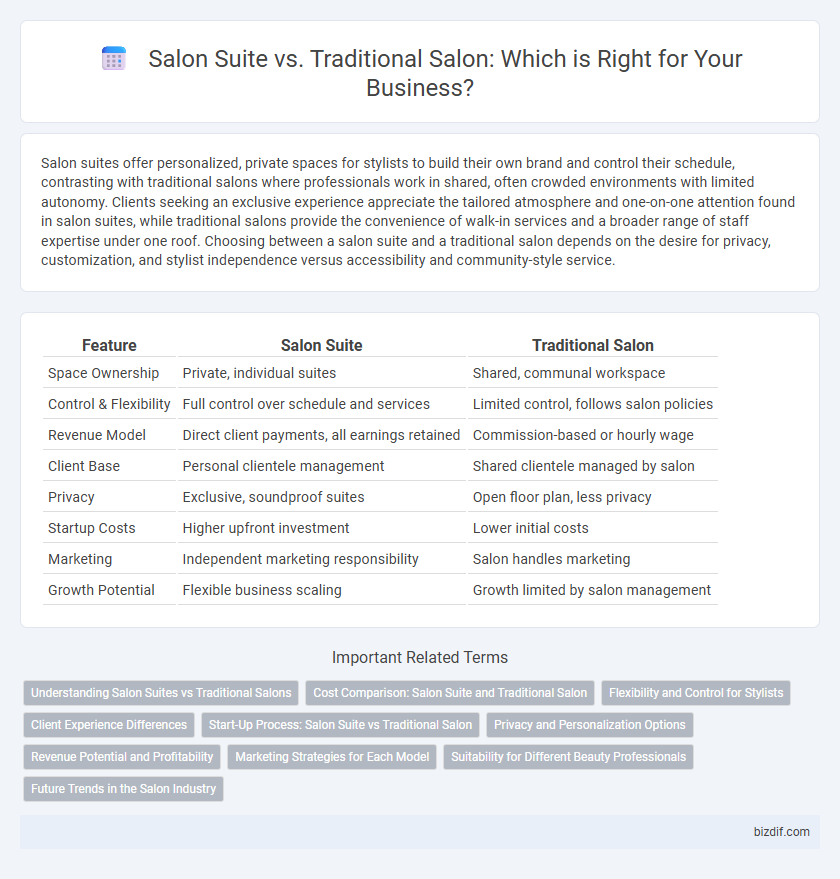Salon suites offer personalized, private spaces for stylists to build their own brand and control their schedule, contrasting with traditional salons where professionals work in shared, often crowded environments with limited autonomy. Clients seeking an exclusive experience appreciate the tailored atmosphere and one-on-one attention found in salon suites, while traditional salons provide the convenience of walk-in services and a broader range of staff expertise under one roof. Choosing between a salon suite and a traditional salon depends on the desire for privacy, customization, and stylist independence versus accessibility and community-style service.
Table of Comparison
| Feature | Salon Suite | Traditional Salon |
|---|---|---|
| Space Ownership | Private, individual suites | Shared, communal workspace |
| Control & Flexibility | Full control over schedule and services | Limited control, follows salon policies |
| Revenue Model | Direct client payments, all earnings retained | Commission-based or hourly wage |
| Client Base | Personal clientele management | Shared clientele managed by salon |
| Privacy | Exclusive, soundproof suites | Open floor plan, less privacy |
| Startup Costs | Higher upfront investment | Lower initial costs |
| Marketing | Independent marketing responsibility | Salon handles marketing |
| Growth Potential | Flexible business scaling | Growth limited by salon management |
Understanding Salon Suites vs Traditional Salons
Salon suites offer personalized, private spaces for beauty professionals, allowing greater control over their brand and schedule compared to traditional salons. Traditional salons provide a shared environment with built-in client flow and collaborative team dynamics but often involve less autonomy for individual stylists. Understanding these differences helps professionals choose the best workspace to optimize client experience and business growth.
Cost Comparison: Salon Suite and Traditional Salon
Salon suites typically involve lower overhead costs since stylists lease private spaces, reducing expenses for shared utilities and reception services. Traditional salons often require higher upfront investments in rent, staff salaries, and inventory, leading to increased monthly operational costs. Clients may experience cost variations, with suites offering personalized services at potentially higher prices, while traditional salons benefit from economies of scale and competitive pricing.
Flexibility and Control for Stylists
Salon suites offer stylists unparalleled flexibility and control over their schedules, pricing, and service offerings, unlike traditional salons where they often adhere to fixed hours and salon-wide policies. This autonomy allows stylists to tailor their work environment and client experience, enhancing job satisfaction and business growth. Greater control over booking, product choices, and branding empowers stylists to build a personalized, scalable business within a salon suite setting.
Client Experience Differences
Salon suites offer clients personalized, private environments tailored to individual preferences, enhancing comfort and relaxation compared to traditional salons. Traditional salons often have multiple stylists working in a shared space, which may lead to increased noise and less privacy for clients. The salon suite model enables one-on-one attention and customized service, resulting in a higher level of client satisfaction and exclusivity.
Start-Up Process: Salon Suite vs Traditional Salon
Starting a salon suite involves significantly lower initial investment compared to a traditional salon, as it requires minimal renovation and fewer staff hires. Lease agreements for individual suites are typically more flexible and shorter-term, enabling quicker setup and reduced financial risk. Traditional salons demand higher capital for equipment, larger space, and comprehensive staffing, leading to longer, more complex startup timelines.
Privacy and Personalization Options
Salon suites offer enhanced privacy by providing individual, self-contained spaces tailored to client comfort and discretion, unlike traditional salons with shared, open-floor layouts. Personalization options in salon suites are extensive, allowing stylists to fully customize decor, ambiance, and service offerings to meet unique client preferences. This private and personalized setting fosters a more exclusive and intimate salon experience, boosting client satisfaction and loyalty.
Revenue Potential and Profitability
Salon suites offer higher revenue potential compared to traditional salons by enabling individual stylists to retain a larger percentage of their earnings and set personalized pricing. Traditional salons typically involve commission splits and overhead costs that reduce overall profitability for stylists. The independent model of salon suites often results in greater profit margins due to lower operating expenses and increased client loyalty.
Marketing Strategies for Each Model
Salon suites leverage targeted digital marketing and social media platforms to attract niche clientele by emphasizing personalized, private experiences and flexible service options. Traditional salons rely heavily on local advertising, walk-in traffic, and broad promotional campaigns to maximize footfall and build brand loyalty through in-person customer interactions. Both models benefit from tailoring marketing strategies to capitalize on their operational strengths and customer engagement patterns.
Suitability for Different Beauty Professionals
Salon suites provide independent beauty professionals with private, customizable spaces that enhance their ability to offer personalized services, making them ideal for solo practitioners and specialists. Traditional salons cater to hairstylists, estheticians, and nail technicians seeking a collaborative environment with shared resources and built-in clientele. Suitability depends on the professional's preference for autonomy versus community engagement and the scale of their practice.
Future Trends in the Salon Industry
Salon suites offer personalized, flexible spaces that cater to the growing demand for independent beauty professionals, driving a significant shift from traditional salon models. Innovations in technology, such as virtual booking and customized client experiences, align closely with the suite model, enhancing efficiency and client satisfaction. Rising consumer preference for privacy, hygiene, and tailored services positions salon suites as a dominant future trend in the evolving salon industry landscape.
Salon suite vs Traditional salon Infographic

 bizdif.com
bizdif.com